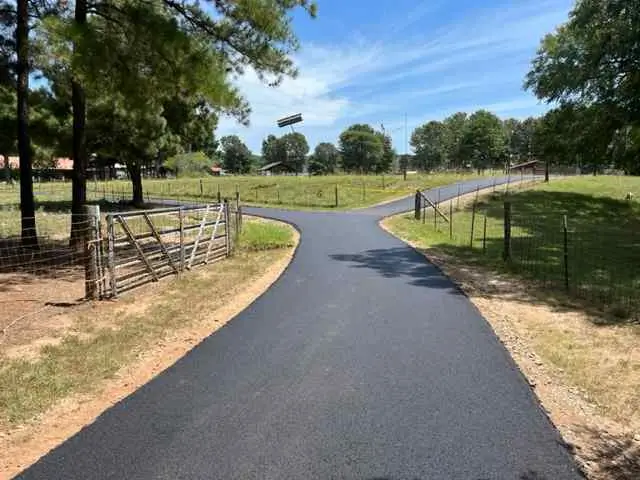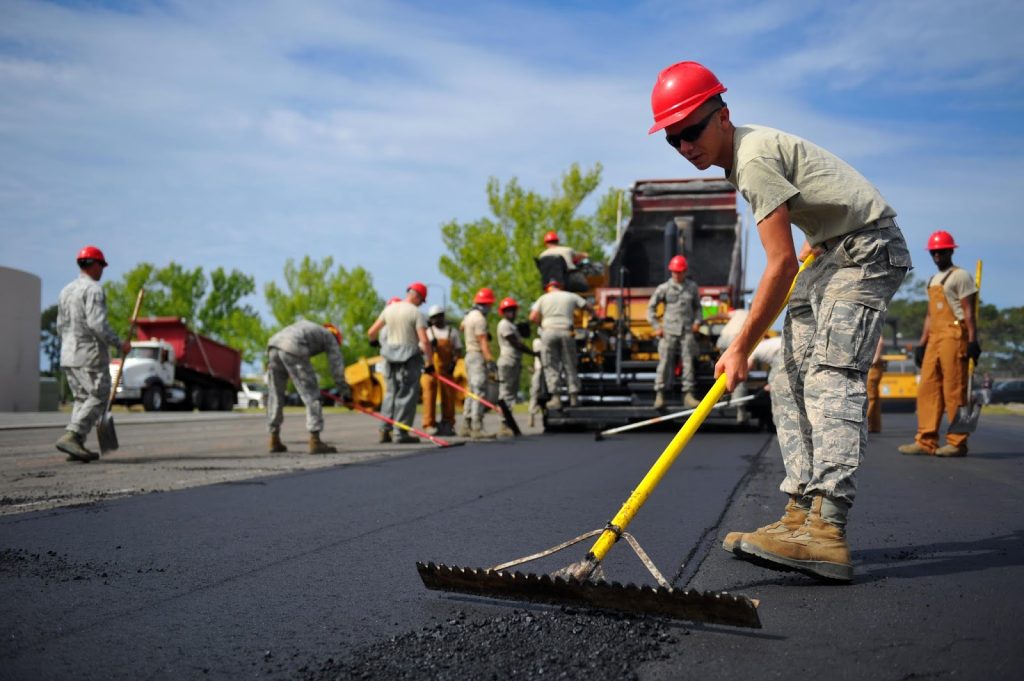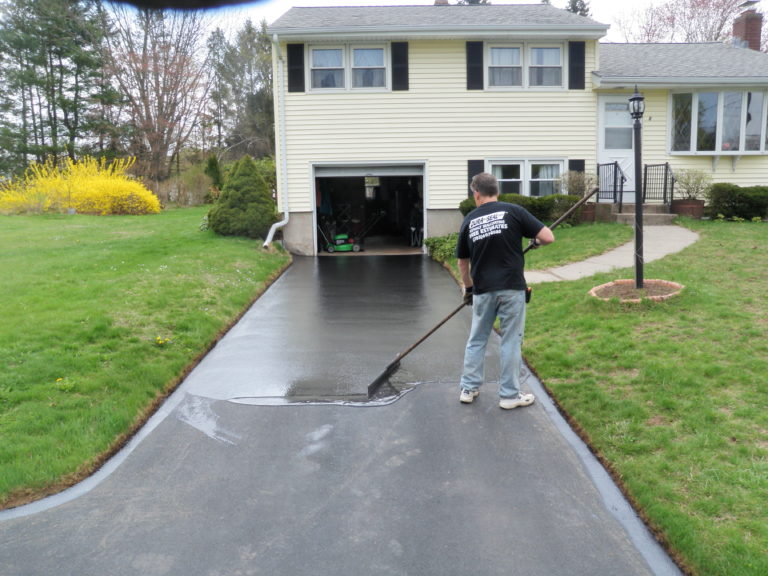Choosing the right paving material is very important if you want to improve the look and functionality of your home. Out of all the choices that are out there, asphalt flooring is often the best option for property owners. This item is great for residential as well as commercial uses because it endures a long time, doesn’t cost much, and is good for the environment.

What is Asphalt Paving?
The most common way to make surfaces like driveways, parking spots, and roads is with asphalt paving. It uses asphalt, which is a mix of mineral aggregates and asphalt, a black, sticky substance that holds the pebbles together. The end result is a smooth, long-lasting surface that can stand up to hard use and bad weather.
How Is Asphalt Made?
Mixing materials, like crushed stone, gravel, and sand, with asphalt is the first step in making asphalt. By heating this combination to a certain temperature, usually between 300 and 350 degrees Fahrenheit, the asphalt melts and covers the aggregates completely. After being brought to the site, the hot mixture is spread out and pressed down to make a solid, smooth surface.
Advantages of Asphalt Paving
Asphalt paving has many benefits, such as being durable, inexpensive, easy to put, and needing little upkeep. Because it is flexible, it can handle changes in temperature without cracking, which makes it perfect for a wide range of regions. You can recycle asphalt over and over again, and its smooth surface makes your home look better from the street. The material also lasts a long time and is easy to fix, which makes it a good long-term investment for property owners.
- Durability and Longevity
A lot of people know that asphalt can stand up to bad weather. No matter how hot it is in the summer or how cold it is in the winter, asphalt stays strong. Because it is bendable, it can adjust to changes in temperature, which lowers the chance of cracks and other damage.
Because it can hold heavy loads, asphalt is good for driveways, roads, and parking places. Its load-bearing ability means that it can hold the weight of cars and trucks without breaking or deforming, even after years of use.
One important thing about concrete is that it can bend. Asphalt can bend and move without breaking, unlike concrete, which is very stiff. This makes it more resistant to changes in temperature and ground movement, which makes it last even longer.
If you take care of asphalt filling, it can last 20 to 30 years or longer. It can last longer if you seal it regularly and fix it when it breaks. This makes it a long-term investment for your home. Considering how cheap it is, asphalt has one of the best lifespans when compared to other materials.
- Cost-Effectiveness
Putting down asphalt is usually less expensive at first than putting down concrete or tiles. Consequently, it is an appealing choice for property owners seeking a cost-effective answer that does not skimp on quality. Installing things yourself can save you a lot of money, especially on larger projects.
In addition to lower initial costs, asphalt saves you money in the long run because it doesn’t need a lot of maintenance. To fix asphalt, it’s usually easy and cheap, and because it lasts a long time, you don’t have to change it as often. These saves can add up over the life of the pavement, which makes asphalt a good choice in terms of cost.
When it comes to value for money, asphalt is often better than other paving materials like concrete, dirt, or pavers. Even though concrete lasts longer, it costs more and cracks more easily, which means it needs more expensive fixes. Gravel, on the other hand, might be cheaper at first, but it needs lots of care and isn’t always as nice to look at. Asphalt is the best choice for many property owners because it is affordable, lasts a long time, and looks good.
- Quick Installation
Fast installation is one of the best things about asphalt paving. Usually, the steps are getting the spot ready, putting down a base, and applying the asphalt. The asphalt quickly cools and dries after being spread, so the surface can be used right away. This quick return is especially helpful for companies that can’t afford to be down for long periods of time.
For business properties, keeping disruptions to a minimum is very important. Usually, asphalt filling can be done in stages, so parts of the area can stay open while the work is being done. This flexibility helps keep business processes and customer access as normal as possible.
You can put down asphalt in a variety of weather situations, but the best time is during the warmer months. The heat makes the asphalt more flexible, which makes it easier to spread out and pack down. But with today’s tools and methods, asphalt can also be put down when it’s cooler, as long as the right safety measures are taken.
- Low Maintenance
One reason asphalt is so famous is that it’s simple to keep up. Patching or resurfacing are quick and easy ways to fix small cracks or holes in the road. These fixes not only save money, but they also make the asphalt last longer, so it stays in good shape for longer.
Regular maintenance is necessary to make sure that your asphalt paving endures as long as possible. This includes sealing the surface every two years to keep water and UV rays from hurting it. Keeping the area clean and free of debris can also help keep small problems from getting worse.
Taking care of asphalt during different seasons is also important. A quick removal of snow and ice in colder areas can keep harm from freeze-thaw cycles. In hot places, re-sealing the asphalt every so often can keep it from drying out and breaking. If you keep up with these maintenance tips, your asphalt paving will stay in excellent condition all year.
- Environmentally Friendly
One of the things that is recycled the most in the world is asphalt. You can grind up old asphalt and use it in new paving projects instead of buying new materials every time. This process of recycling not only saves natural resources but also lessens the damage that making asphalt does to the earth.
It takes very little energy to make asphalt, especially warm mix asphalt. Using lower temperatures during production results in using less energy and releasing fewer pollutants into the air. Because of this, asphalt is better for the earth than other types of pavement.
Asphalt can also help lower the urban heat island effect, which is when cities get much warmer than the rural places around them. Using reflective layers or lighter-colored asphalt can help keep the surface cooler by reducing the amount of heat it absorbs.
- Aesthetics and Curb Appeal
Asphalt can be more than just useful; it can also look good. You can make asphalt fit the style of your home by choosing from different finishes and designs. You can make asphalt look however you want, whether you want a standard black surface or something more special.
Having a well-paved driveway or parking lot can make your home worth a lot more. Potential sellers like the way clean and smooth asphalt looks, and it can make a good first impression. Spending money on good asphalt paving can raise the value of your home and make buyers more interested.
Because asphalt looks smooth, it goes well with a lot of different landscape styles. No matter if your home has lots of greenery, modern building, or a more rustic look, asphalt can blend in with your landscaping and make your home look better overall.
Process of Asphalt Paving
There are four main steps in the asphalt paving process: getting the site ready, setting a stable base, applying the hot asphalt mixture, and pressing it down to make a smooth, durable surface. For example, clearing the site of trash and leveling it so that water can run properly are part of site preparation. After that, a base layer is put to give support. Once the asphalt is put down, it is packed down to make sure it lasts. The process is quick and easy, and you can start using it within days.

Preparing the Site
The first step in filling with asphalt is getting the area ready. Clearing the area of any trash, plants, or old sidewalk is part of this. This makes sure that the ground drains well and has a smooth surface for the asphalt.
Laying the Base
A base layer is put down after the spot is ready. Usually made of crushed stone or gravel, this base gives the asphalt a stable place to start. Compressing the base layer makes it hard and level, giving the asphalt a strong base that will last for years.
Asphalt Application
The hot asphalt mixture is put down after the base is ready. Specialized tools spread the asphalt evenly across the area, making sure that the thickness is the same everywhere. The asphalt is then pressed down with rollers to get rid of any air spaces and make the surface smooth and solid.
Compaction and Finishing Touches
Compaction is the last step in the process of filling with asphalt. It is necessary to roll the surface to make sure it is hard and even. To make a smooth finish, any edges or changes are smoothed out. The asphalt is ready to use once it has cooled down and become hard.
Choosing the Right Contractor
It is very important to choose the right asphalt paving provider for the project. Look for contractors who have a lot of knowledge, the right licenses, and good reviews. Make sure they use good products and do things the right way in their field. It’s important to ask about project timelines, prices, and possible problems. To make sure the paving process goes smoothly and reliably, a reputable contractor will offer clear communication, a detailed plan, and recommendations from past clients.
- What to Look for in an Asphalt Paving Contractor
Choosing the right contractor is very important for making sure that your asphalt paving job goes well. Find a contractor who has done this before, has a good name, and has the right licenses and insurance. Also, make sure the contractor you pick uses good products and the best methods in the business.
- Questions to Ask Your Contractor
Before you hire a contractor, see how much experience they have, which resources they use, and how they handle projects. You should also ask how long the project will take, how much it will cost, and if they see any problems that might come up. A trustworthy contractors will be honest and give you clear answers to your questions.
- Importance of Experience and Credentials
When hiring an asphalt paving contractor, experience and qualifications are very important. A worker with a lot of experience will have a history of making projects work and will be able to handle any problems that come up. A contractor’s commitment to quality can also be shown by any certifications or memberships they have in the business.
Comparing Asphalt with Other Paving Materials
People often choose asphalt over concrete, gravel, and pavers for flooring because it is cheaper, lasts longer, and is easier to put down. Although concrete endures longer, it cracks easily and costs a lot to fix. Gravel is hard to keep clean and doesn’t look good. Pavers look great, but they are expensive and need a lot of maintenance. As a result, asphalt is a great choice because it is durable, affordable, and requires minimal maintenance.
| Asphalt vs. ConcreteWhen you compare asphalt to concrete, asphalt is usually cheaper and easier to add. And even though concrete can last longer, it cracks more easily and costs more to fix. Because asphalt is flexible, it works better in places where the temperature changes a lot. | Asphalt vs. GravelGravel is often used for driveways and country roads, but it needs to be maintained all the time and doesn’t always look good. Asphalt, on the other hand, has a smooth, long-lasting surface that looks better from the street and needs less maintenance. | Asphalt vs. PaversPavers can make a surface that looks great, but they cost more and take longer to put down. They also need more maintenance to keep weeds from growing and moving. Asphalt is a more affordable and simple to take care of option that still gives you a clean and nice surface. |

Asphalt Paving for Different Properties
Different types of properties can use asphalt paving, such as residential driveways, business parking lots, industrial areas, and public parks. It provides a smooth, nice surface for paths in homes. It’s long-lasting and easy to maintain, which is good for commercial buildings. Heavy machinery needs to be able to run on it, and recreational places like how smooth and safe it is. Its flexibility means that asphalt can work well in a wide range of conditions.
- Residential Driveways
Asphalt is an excellent option for paths in homes because it endures a long time, doesn’t cost much, and looks good. A well-paved concrete driveway can make your home look better from the street and give your cars a smooth, safe place to drive.
- Commercial Parking Lots
For places to park at companies, asphalt is the best material to use. Businesses can save money on costs by using it because it endures a long time and doesn’t need a lot of maintenance. Also, asphalt is easy to stripe and mark, which makes for a well-organized and useful parking lot.
- Industrial Areas
Many loading docks, access roads, and other high-traffic places in factories use asphalt. Heavy machinery and big vehicles can drive on it because it is strong and flexible. This makes it a long-lasting surface that can handle the wear and tear of workplaces.
- Recreational Spaces
Recreational areas like parks, sports courts, and walking paths also use asphalt. When you’re doing different kinds of activities, its smooth surface makes it safe and fun, and its sturdiness means it can handle regular use.
Conclusion
When it comes to durability, cost-effectiveness, and good looks, asphalt paving is the best choice for any building. For a reliable and attractive solution, asphalt is a good choice whether you want to pave a private driveway, a business parking lot, or a recreational area. It’s an environmentally friendly product that is easy to install and won’t need much maintenance. It’s a good purchase that will serve you for years.
